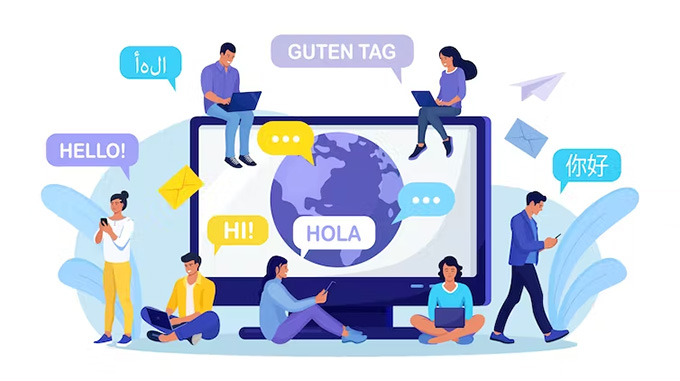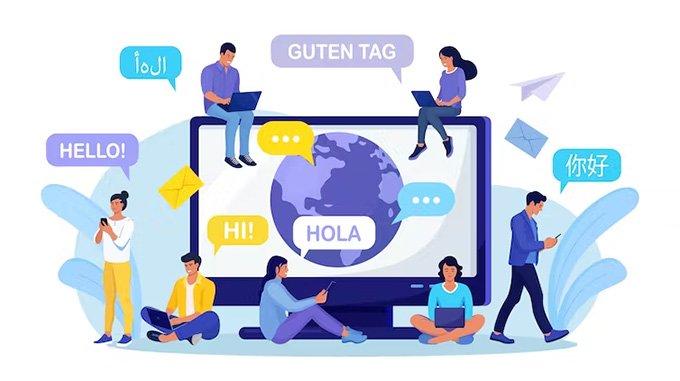
Many of us live in societies that are no longer characterized so much by their diversity as by their “super-diversity” , to use the words of anthropologist Steven Vertovec. More and more people are circulating around the world, bringing their languages and cultures on a journey. In Great Britain, for example, 20% of pupils are multilingual and speak at least one language in addition to English.
Parents already have a lot to do to feed their children, keep them safe and educate them. But for families in which several languages are spoken , it is also a question of positioning oneself on the ground to decide how they will be practiced.
While linguists have long been interested in issues of parenthood and bilingualism , a reassessment of the complexity of our superdiverse societies brings a new approach. What experts call plurilingualism considers the use of languages from a much more fluid and dynamic angle.
With previous theories, strict rules were often advocated in language learning. According to the “One language, one parent” rule , to avoid confusion, each parent speaks to the child in their mother tongue. Other parents decide to speak only their native language at home, while the language of the country will be learned at school.
The adoption of a multilingual approach brings, on the other hand, a certain relief. She suggests that there is no immutable rule, that we can decide what is appropriate on a day-to-day basis and adapt to situations. In short, there is no longer any contraindication to the mixing of languages, to their use in other frameworks than those initially fixed.
Celebrate linguistic diversity
We already know how important plurilingualism is in education , both for the success and for the well-being of multilingual pupils.
In order to understand how this translates into the private sphere, I conducted a study in 2018 with 20 parents who immigrated to Canada from nine countries in Central and Eastern Europe and found that the type of parenting they instinctively adopted is truly multilingual .
The parents I spoke to believe in fluid and dynamic language use . Many send their children to French language immersion programs where instruction is in both English and French, while accepting that their children’s French skills are unlikely to match their English skills. .
On a daily basis, parents and children switch from one language to another. They can start a sentence in one language and end it in another. When their grandparents come from Europe, the children converse in the language they speak. But, if a friend comes to play with them, then they opt for English.

Plurilingualism is important in education, both for the success and for the well-being of multilingual pupils. Shutterstock
Plurilingual education implies a more liberal approach . Many parents do not believe in punishing children who speak the “wrong” language at home. Even those who were strict at the birth of children quickly realized that their children spontaneously switch from one language to another. And they don’t see it with a negative eye.
Finally, one of the key points of plurilingual parenthood is the interconnection between language and culture . As parents cross borders, they bring a wealth of cultural baggage with them, and language is tied to issues of identity and belonging that immigrant parents regularly have to negotiate in their homes.
Speaking Bulgarian in Canada allows children to connect with their parents’ country, even if they consider themselves Canadian. It is especially important for parents to keep their native language and they pass this importance on to their children as well. As one Ukrainian parent said, “It’s our history, it’s our heritage”.
Be open to language learning
You may have heard that speaking two languages in the family confuses children, delays them in language learning and hinders their academic success. These are actually myths that researchers have spent decades debunking. They thus showed that bilingualism, on the contrary, has cognitive advantages .
Many educators have warned against introducing new languages into a child’s life too early or mixing languages. Another common piece of advice is to make sure that the child only learns a language from native speakers in order to obtain a perfect accent, impeccable grammar and a rich vocabulary.
This type of self-imposed rules is a source of discord in family life when parents try to regulate children’s use of a particular language. Plurilingualism, on the other hand, stems from a new understanding of how languages are used and emphasizes a more fluid approach.
This school of thought values all the languages that a given student is able to use, regardless of their level in one or the other. It seeks to develop attention to linguistic facts, their cultural knowledge and their openness to language learning, while progressing in the language which is the subject of the course.
And consistent with previous studies of multilingual learners , in my study all students performed well academically, whether they were in English schools, bilingual French immersion schools, or at the International Baccalaureate. Obviously there is nothing wrong with retaining one’s original language and culture. And this flexible family language policy saves parents and children many battles.
Author Bio: Max Antony Newman is aLecturer in Education Studies at Sheffield Hallam University
